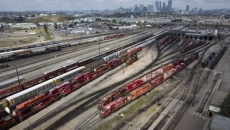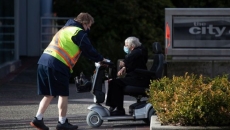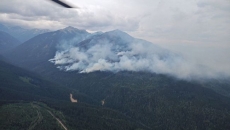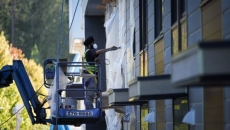Canada's renewed charm offensive in the United States is "more relevant than ever," Industry Minister François-Philippe Champagne said Tuesday, as the federal cabinet retreat turned its attention to the Canada-U.S. relationship.
"Folks watching at home would say a lot of things have happened in the United States in the last few months," he said, midway through the third and final day of the retreat in Halifax.
"And that's true. The good thing, though, is that the strategy that we have put forward is very, very relevant, probably more relevant today than ever."
We have to be strategic!
— François-Philippe Champagne (FPC) 🇨🇦 (@FP_Champagne) August 27, 2024
Our relationship with the US is built on mutual reliance—from supply chain resiliency to security, good jobs and economic growth.
We’re making sure everyone knows what Canada has to offer! pic.twitter.com/xpZktI9BDH
Last January, faced with a looming presidential election and the real possibility of another Donald Trump presidency, Prime Minister Justin Trudeau relaunched the Team Canada strategy his government initiated during Trump's first term.
With more than three million Canadian jobs — about one in six — reliant on exports, and three-quarters of Canadian exports going to the United States, the trade relationship with the U.S. is critical in all corners of this country.
Dubbed by some as the "maple charm offensive," the goal of the strategy is to engage a full-court press on Canadian interests with all levels of government, as well as business and union leaders. It is led by Champagne, Trade Minister Mary Ng and Kirsten Hillman, Canada's ambassador in Washington.
Hillman said since January the trio has visited 33 states and met with 42 governors, as well as mayors, senators, trade officials, business executives and labour groups.
"We need to make sure we are present and we are in the minds of American lawmakers from across the country and from both parties as if they are developing their policies," she said.
When the strategy kicked off in January, Trump was expected to win the Republican nomination and President Joe Biden was to be the Democratic party nominee again. In July, faced with questions about his age and mental acuity and losing in the polls to Trump, Biden stepped off the ticket.
Vice-President Kamala Harris replaced him, giving her party renewed energy and momentum and she surged into a narrow lead over Trump in less than a month.
Hillman said the strategy is working, no matter who ends up winning the White House.
"I don't think we have any reason to be concerned under, to be frank, either administration," she said.
On Monday night, the cabinet met with C.J. Mahoney, the former U.S. deputy trade representative who led the new NAFTA talks for the White House six years ago, and Steve Verheul, Canada's former chief trade negotiator who led those talks for Trudeau and the Liberals.
Hillman said the conversation focused a lot on what Trump's and Harris's policies are expected to be, and what that means for Canada.
She said while Harris may be new to the top of the ticket, Canada has insight into her plans from her speeches and doesn't expect her to waver much from Biden's plan.
The Liberals and Democrats share more ideology, but the relationship hasn't been without bumps, including earlier this month when the White House raised the softwood lumber tariffs Canada has been fighting since 2017.
Trump is unpredictable and his first term was difficult for Canada, forcing the renegotiation of the North American Free Trade Agreement and imposing punishing tariffs on steel and aluminum in 2018 that were in place for about 12 months.
He has also pledged to impose a 10 per cent flat tax at the border for all imported goods.
"I think that candidate Trump has some thoughts on global tariffs which could be complicated for Canada," Hillman said. "But I also think that the application of those to Canada will be very difficult for the United States. And so, when we get into that discussion, if it ever comes about if he's elected and we're in that discussion, I'm confident that we're going to make our way through that in a way that works for Canada."
Champagne said security, supply chains and economic growth are the three pillars of the Team Canada approach. But he avoided answering when asked what pressure he gets from Americans on supply chain confidence, with numerous disruptions within Canada in recent years, including port strikes, the 2022 Freedom Convoy border blockades and, in the last week, the national rail labour stoppage.
Instead, Champagne went on at length about the products Canada has that America wants and needs, such as cobalt, graphite and titanium.






